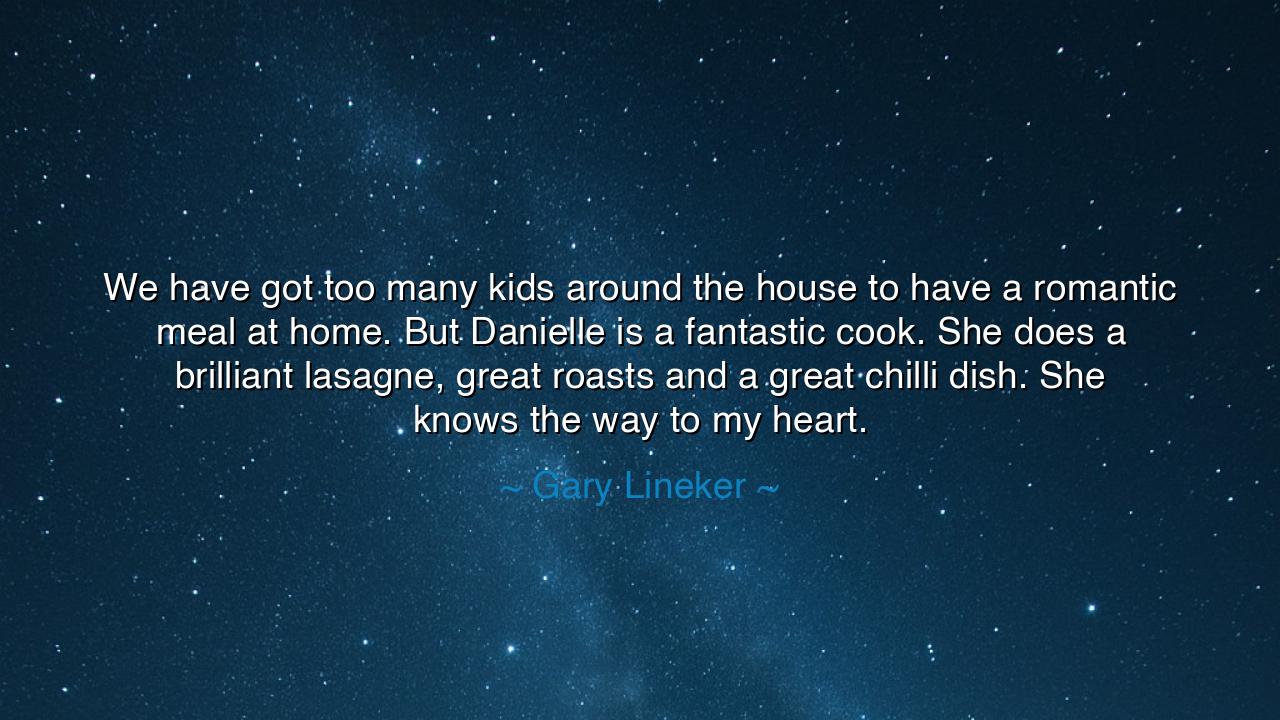
We have got too many kids around the house to have a romantic
We have got too many kids around the house to have a romantic meal at home. But Danielle is a fantastic cook. She does a brilliant lasagne, great roasts and a great chilli dish. She knows the way to my heart.






Listen closely, O seekers of wisdom, and hear the words of Gary Lineker, who speaks of love, family, and the nourishment that binds hearts together. "We have got too many kids around the house to have a romantic meal at home. But Danielle is a fantastic cook. She does a brilliant lasagne, great roasts and a great chilli dish. She knows the way to my heart." In this simple yet profound reflection, Lineker reveals the quiet power of home, family, and food in forging deep emotional connections. Though the world often romanticizes extravagant gestures of love—dinners in candlelit restaurants, grand declarations of affection—true intimacy and love often thrive in the quiet, everyday moments shared in the kitchen, around the table, and through the act of nourishing one another.
Consider, O wise ones, the ancient understanding of food as more than just sustenance for the body, but as a means to bind souls together. In the Greek tradition, the symposium was a gathering not only for intellectual discussion but for the sharing of meals—each course an opportunity to engage in deep conversation, to exchange ideas, and to forge bonds of friendship and affection. In many ancient cultures, the act of sharing food was sacred. The feast, the banquet, and the shared meal were moments of union, where the physical nourishment of the body became a symbol of the nourishment of the soul. Lineker’s words echo this ancient truth: the meal, simple as it may be, is a powerful vehicle for connection.
Danielle, in Lineker’s eyes, is not just a woman who can cook well—she is someone who understands the deeper power of food. Lasagne, roasts, and chilli dishes may seem like ordinary meals, but in them, she offers more than just flavor. She offers care, attention, and love—ingredients that are as essential to the meal as the spices and herbs themselves. When Lineker speaks of the way to his heart, he is not merely referencing a plate of food, but the way in which Danielle nurtures him through her craft. Just as the ancients saw cooking as an expression of love and care, so too does Lineker understand the value of these everyday acts of nourishment that weave threads of connection between those who share them.
Think, too, of the ancient Romans, who believed that the banquet was a celebration not only of food but of the bonds between family and friends. Their feasts were times of revelry, but also of honoring those they loved. The cooking and sharing of meals was considered an act of hospitality—to welcome someone into your home was to share not only food but a piece of yourself. The great Roman orators and leaders often shared meals with their followers as a way of solidifying bonds and gaining loyalty, understanding that the way to a person’s heart was not through flattery or conquest, but through the simple act of sharing something real—food, time, and attention.
Thus, O wise ones, there is a profound lesson here in Lineker’s words. The romantic does not always reside in grand gestures or extravagant outings, but in the everyday acts of care, in the quiet moments of nourishment shared between people. Love is not only expressed through passionate words or opulent displays, but in the simple ways we tend to one another's needs—whether through cooking, listening, or sharing time. Danielle’s skill in preparing meals is not just a means to an end; it is an act of nurturing, of showing love, and of creating a space where intimacy and connection can flourish.
Consider the tale of Penelope, wife of Odysseus, whose story is not just one of waiting but of managing the household, keeping the fires of home alive with the same devotion that she kept her love for Odysseus. In her heart, she understood that the home—with its daily routines, the preparation of food, the care for loved ones—was a sanctuary where love could endure. The meal was not just a sustenance for the body, but a ritual that upheld the very foundation of their love. In this, we see that the romantic can be found not in the pursuit of perfection, but in the simple, daily acts of devotion.
In your own lives, O wise ones, remember this: love is not always found in grand declarations or romantic getaways, but in the small, daily acts that build a strong foundation for connection. Whether you are cooking a meal, offering a kind word, or sharing a moment of quiet understanding, you are creating a space where love can grow. Let your acts of care—like Danielle’s cooking—be a way to nurture the bonds that tie you to those you love. Recognize the power of these moments, and embrace the everyday opportunities to show love, care, and devotion.
So, take this wisdom with you: let the simple acts of care—the shared meal, the quiet moment—be the ways in which you deepen your connections with others. Just as the great leaders of the past understood that food could nourish not just the body but the spirit, so too should you see your everyday interactions as opportunities to build lasting bonds, to share love, and to create a space where romance is found in the humblest and most authentic of ways.






AAdministratorAdministrator
Welcome, honored guests. Please leave a comment, we will respond soon